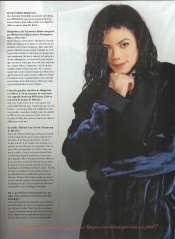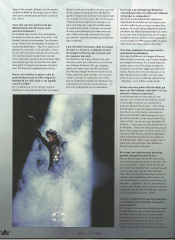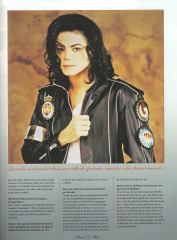Brad Buxer Interview (Black & White, November/December 2009)
From Sonic Retro
Brad Buxer Interview is a four-page interview with one of Michael Jackson's former collaberators. In this interview there are a few Sonic-related questions and Michael Jackson is confirmed to have worked on Sonic the Hedgehog 3. This interview was published in the French language Black & White magazine.
Translation
- Translation provided by SegaLoco
Page 74
Brad Buxer Musician, Arranger [Dangerous, HIStory]
Keyboardist and arranger on all albums since Dangerous, Music Director of the Dangerous and HIStory Tour, Brad Buxer was the closest and most loyal artistic associate to Michael for over 15 years. In a quiet and unassuming nature, this incredible musician, now an airline pilot, did, however, never speak about his work with the King of Pop. In tribute to his late friend, Brad speaks for the first time ...
Black & White: How did you come to work with Michael?
Brad Buxer: In 1986 I toured with the Stevie Wonder's band. But as you know, Michael was a big fan of Stevie and, therefore, it was paying serious attention to the musicians who worked with him ... Until 1991, so I toured with Stevie but in the meantime, thanks to him I could get to know Michael. I will never forget my first encounter with him. A current immediately passed between us. Musically speaking, we were on the same wavelength, we spoke the same language. And purely human, we instantly became friends. Bonds were created naturally, and they have only strengthened over time ....
Black & White: Soon Michael and you got involved in the creative process
Page 75
of what would become the album Dangerous ...
Brad Buxer: Yes. Before Teddy Riley is working on the album, with Bill Bottrell, we recorded several demos, including those Who Is It, Black Or White or Heal The World ...
Black & White: Dangerous was the first album recorded without Michael by Quincy Jones. Why do you think he did this?
Brad Buxer: Let me be clear: Michael was not angry with Quincy. He has always had an admiration for him and an immense respect. But with Dangerous, Michael wanted to control the creative process from A to Z. Simply put, he wanted to be his own boss. Michael was always a very independent, and he also wanted to show that his success was not because of one man, namely Quincy. However, Quincy still had a lot of opinions. This showed when we finished Dangerous and Michael called Quincy to help him at the end. Quincy still had a lot of opinions about the album. And when Quincy said we had a masterpiece, Michael was no longer hesitant to release the album ...
Black & White: One of the great successes of Dangerous is Who Is It. But the structure of this song reminds many Billie Jean. Was this conscious on the part of Michael?
Brad Buxer: No, I do not think so. I never really paid attention but now that you say is true, Who Is It and Billie Jean are very close. However, despite all the qualities of Who Is It, I do not think it comes close to Billie Jean. No song is better than Billie Jean, I think ...
Black & White: In the studio, Michael gave you a lot of freedom?
Brad Buxer: Absolutely. Michael was not one of rigid, it was always open to my suggestions and ideas. He gave me full confidence. Most often, I sang a melody, and I found the arrangements to accompany him. Regarding arrangements for strings or sheets of synth, I tended not to do, and intervened when he found that the direction in which I was not good. Even if a musical point of view, Michael was a genius, he knew he could not do anything and he had the intelligence to delegate some things. Sometimes, he knew exactly what he wanted to hear me sing all the parts of a song. Other times, he let me play until he hears something he likes. This is particularly what happened to songs like "Who Is It or Stranger In Moscow.
Black & White: Is that Michael sometimes wrote the lyrics of a song before a melodic idea?
Brad Buxer: No, it's almost never happened. Michael was still writing the lyrics at the last minute, on a piece of table. It was one of his hands. [laughs] He expected that often the instrumentation of a song is completely finished before writing lyrics. And it made us crazy
Page 76
sometimes! For example, Michael wrote the lyrics of Black Or White in 20 minutes in the studio while we waited to do his voice making. [laughs]
[Bottom of Page: He hit so hard that the false bilum disintegrated under his feet!]
Black & White: Did you sometimes feel that Michael was frustrated not knowing how to play an instrument?
Brad Buxer: Not really. But once he asked me to give him piano lessons. I told him: "Ok Michael, do it seriously. Every day, you'll sit with me for 15 minutes and there will be a little lesson. But he never had the patience to apply themselves to this discipline. [laughs] I think he knew he did not need to play an instrument to express his talent. While he may not have played an instrument, he was still a fantastic musician. He instinctively understood the music. It was just part of him ...
Black & White: Can see clarify the rumor that Michael had in 1993 composed the music for Sonic 3 video game, which you will be credited?
Brad Buxer: I've never played and I do not know what the developers have kept the tracks on which Michael and I have worked, but we did compose the music playing Michael called me at the time for give him a helping hand on this project, and that's what I did. And if he is not credited for composing the music, because he was not happy with the result sound coming out of the console. At the time, game consoles did not allow an optimal sound reproduction, and Michael found it frustrating. He did not want to be associated with a product that devalued and his music ...
Black & White: One of the surprising things in the music of Sonic 3 is that you can hear the chords of Stranger In Moscow, which is supposed to have been composed later ...
Brad Buxer: Yes, Michael and I had made the following arrangements for the game, and it has served as the basis for Stranger In Moscow. More than any other song that I worked with Michael, Stranger In Moscow is where I made my most artistic leg. I'm not credited as co-composer on this track, but I have worked closely with Michael on the composition and structure of this song ... I also played virtually all instruments ...
Black & White: Did that not bother you that Michael did not include it in the song credits as co-composer?
Brad Buxer: No. I did not ask to be. When you have the opportunity to work with such a musical genius, be credited or not, it does not really matter. I had a great opportunity to working with Michael all these years. I'm probably the musician with whom he worked most of his career. I was a musician and arranger from 1989 until 2006. It shows how we were on stage, him and me ...
Black & White: You also play almost all instruments on Morphine ...
Brad Buxer: Yes, but unlike Stranger In Moscow Michael knew exactly what he wanted to hear each instrument pure. He sang all the parts, whether the piano in the middle of the song, or those sheets of synth on the chorus. Everything is his. On this song, so I simply carried out his ideas. With two sound engineers, it has even been singing the word "Morphine" on the chorus. It was very fun ...
Black & White: Can you tell us about In The Back, appearing on The Ultimate Collection? It is a truly exceptional piece ...
Brad Buxer: I'm glad you mentioned this song because it's one of my favorites. This title is unbelievable and it proves once again how Michael was a genius ... Like morphine, I play almost every instrument on this song, but all ideas are Michael. What a pity he did not write the words as such deserved to be completed 100%. It is also Beautiful Girl, by the way ... We worked so hard on In The Back ... We recorded a lot of parts that are not on the version you know. Bill Preston [legendary keyboardist who worked with the Beatles or the Rolling Stones, Editor's note] is by example from the studio to play the organ. But Michael did not finally kept this part ...
Black & White: Do you experiment a lot while recording a title?
Brad Buxer: Yes, because Michael loved finding new sounds that the human ear had ever heard. Often, he repeated: "Brad, get me a sound that hurts really bad." That meant he wanted something that shakes him inside. Even if we had much use of machines and computers to design some sounds of drums, sometimes we find more ideas ... organic, I would say. For example, we came banging on the lid of a grand piano with a baseball bat-ball kick to design a specific drum. [laughs]
Black & White: You've recorded new songs with Michael after Invincible. You can tell us about?
Brad Buxer: Yes, the newest piece on which we worked, Michael and me, From The Bottom Of My Heart, the title was out to raise money for victims of Hurricane Katrina ... Overall, the songs we recorded during the latest years are of exceptional quality. Contrary to
Page 77
popular belief Michael was not an artistic decline. He bubbled with ideas. And these songs on which we worked are more original and more creative than we've done together.
[Under picture: The video took place in a theater, but the roles were reversed ...]
Black & White: Michael has never been lacking inspiration?
Brad Buxer: No. At no time in his life Michael has been lack of inspiration ... Plus he went through many trials, as has been the case in 2005 with the trial, and this had a positive influence on creativity.
Black & White: Do you think we will hear in the near future these songs recorded during the last years of his life?
Brad Buxer: I am not allowed to speak, but it is very likely ...
Black & White: Are you staying in contact with Michael afterwards?
Brad Buxer: Last year, he called me to work with him again. The problem is that having spent my pilot's license, I had just been hired by an airline. And projects like Michael were quite vague and did not even have a label behind him, I could not risk giving my resignation and losing one job like that. I needed to know where I was and there, in this case, it was not the case at all. Having 51 years today, I might never be committed again later. To my regret, so I had to refuse to work with him again.
Black & White: What are the best memories you keep of Michael?
Brad Buxer: All those laughs we had together ... I remember the races we were in the corridors of the hotel when we were on tour, or the food fights in our rooms ... But mostly, I always remember his smile when we listened to a song completed. There was a lot of pride, love and respect in this regard. And the feeling was mutual ... For nearly 20 years, I have been fortunate to count Michael among my best friends. We had the same age, him and me. Needless to say I miss him terribly ...



